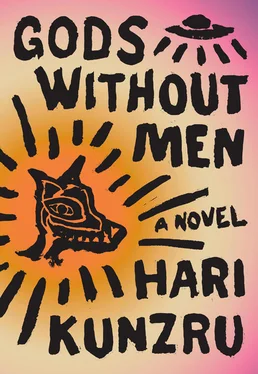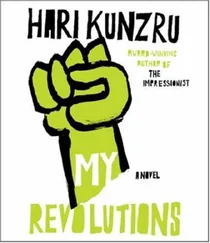“I’m so sorry. Was he bothering you?”
“Uh, no.” He had an accent. He rubbed his face and sat up straighter. “Just having a kip.” British. Maybe Australian.
“Come on, Raj.” Jaz spoke soothingly. “Mommy’s waiting.”
Raj didn’t move, just rocked a little harder. The guy leaned toward him, showing a mouthful of crooked teeth. “Awright, little man?” Of course Raj didn’t answer. The guy sat back again and looked up, shielding his eyes against the sun. Jaz caught the stink of stale sweat. Was he actually a motel guest? Maybe he’d just wandered in off the highway.
“Shy, your lad.”
Jaz didn’t want to get into the details of Raj’s condition with this character.
“Sure. He can be like that around strangers.”
“Right.”
“OK, son, let’s go. Come with Daddy.”
Raj made it hard. He wouldn’t give Jaz his hand, and when he was picked up he used all his most effective protest tactics, going alternately limp and rigid, squirming in Jaz’s grip like a fish.
“Stop it now. Come with Daddy. Daddy needs you to come along.”
The man watched them struggle. Jaz tried not to feel embarrassed. He’d never got used to this part of being Raj’s dad: the scenes, the way they were always the center of attention. They could never blend in, be a normal family. Lisa was tougher than him, but then of course she had to be: She was around the boy all day without a break. At least Jaz could leave, go to work.
Every weekday morning for four years Jaz had felt guilty. Guilty as he closed the front door and headed for the subway, guilty as he bought his Times at the newsstand; it was always such a relief to be away from Raj’s relentless tantrums. Lisa had a shitty deal and he knew it and she knew he knew, and that was the hairline crack in the bowl, the start of their trouble. Before Raj came along they’d been fine. A terrible thing for a father to think about his son, but it was true. Despite the craziness at the firm, the foul-mouthed traders, the pressure from Fenton to sign off on Bachman’s latest apocalyptic scheme, work was an oasis of tranquillity compared to what the child had waiting for him at home — the sinking feeling as he turned the key and called out hello and tried to judge from Lisa’s face and posture just how bad it had been for her that day. When he was born Raj wouldn’t feed. He hated to be picked up. Then, when he started teething, he ground at Lisa’s nipples like an animal. He transformed her. She became a weeping hollow-eyed version of herself, a wan creature in thick socks and sweatpants, her lovely long blond hair plastered to her scalp. This is not my son, Jaz caught himself thinking. My son would not do this to my beautiful wife.
Always the same routine. Putting his laptop bag down, trying to be helpful. Come on, I’ll do that, give him to me . Hearing about what new punishment Raj had devised, how unwilling he was to be cuddled or consoled. He’d sit on the impractical white couch where they’d once tried not to spill red wine — the couch now stained by spatters of puréed carrot — and absorb Lisa’s anger, sitting silently as she shouted at him. Because he was there. Because no one else would understand. Then he’d hold her as she cried, smelling her hair, its scent of milk and baby shit and that mysterious authoritarian note of licorice he’d come to hate, the smell of his son.
Raj wasn’t a normal baby. That had been obvious from the start. He didn’t sleep, just lay there in his newly bought crib in his newly painted nursery and screamed, full-throated continuous yelling, primal and fierce. He sounded so outraged at having to inhabit that brightly colored box with its mobiles and plush toys and mural of zoo animals. The worst of it was his refusal to let them calm him. It cut Lisa to the bone. Jaz, he flinched. I went to hold him and he flinched . He’d tell her it wasn’t her fault. She was a good mom, a great mom. He’d say those things and stroke her hair and she’d insist it was impossible. How could she be a good mom if her own baby was afraid of her? He didn’t have an answer. He wasn’t used to that, to not having the answer.
The doula told them it happened that way sometimes. Raj would calm down soon enough. All babies were different. All parenting experiences presented unique and rewarding challenges. Jaz didn’t think of Raj as a rewarding challenge. Those inhuman cries, like those of a fox or a cat; the feral horror he exhibited when Jaz brought his face up close. His mother had Punjabi village words for what Raj was, words Jaz forbade her to use in his house.
They wouldn’t sleep for days at a time. They didn’t go outside. By the front door stood a thousand-dollar stroller, unused, plastic wrap still sleeving the handles. All the images they’d had of their new life, walking in Prospect Park bundled up in scarves and hats, holding hands — a proper American family. They’d never even put him in the thing. Jaz extended his leave to a month. His boss sent technicians to install a VPN in the study: trading screens, a terminal connected to their trading engine. He’d sit upstairs, doing regressions on the latest cluster of datasets, and listen to the chaos downstairs. After two months they demanded he go back to the office. Lisa understood. Raj would be her job. It was a question of earning power. She looked like a ghost.
They got a nanny, of course. She came from an agency, very expensive. A Jamaican church lady called Alice, middle-aged and severe. She gave in her notice after three weeks. Elena was from Puerto Rico, young and curvy. She’d tune the kitchen radio to reggaeton stations and dance in front of the ironing board. Jana was a Slovak student. There was another one, a Dominican who left after a week. None of them lasted. Raj drove them all away.
That was how they lived for the first two years. Jaz had once been overturned white-water rafting. One minute he was clutching a paddle and squinting into the spray, the next he was spinning round underwater. That was what it felt like. The suddenness, the extremity. By the time Raj’s diagnosis came, it wasn’t a surprise. They took him to the pediatrician — a new pediatrician, the third — just before his second birthday. He tried a few simple questions, asked him to point to things, to pretend to make a call on a plastic toy phone. Soon enough Jaz was standing outside the clinic, oblivious to the December wind howling down Lexington Avenue, the Midtown traffic, the people shouldering past on the sidewalk. He was the father of an autistic child. What were the odds? He knew exactly. One in ten thousand in the seventies. Now down to one in a hundred and sixty-six. Jaz made his living building mathematical models to predict and trade on every kind of catastrophe. And now this: an event for which he had no charts, no time series. An entirely unhedged position.
In the glove compartment of their car was yet another packet from Jaz’s mom, just the same as all the others, on the envelope the shaky handwriting that wasn’t even her own — she couldn’t write in Punjabi or English — and inside a little wrap of kajal and a locket and a letter, written by his aunt Sukhwindermassi. It had all the usual crap in it, pleas for him to bring Raj home to Baltimore, to see an astrologer, to apply the black soot to Raj’s forehead and put the charm round his neck and find an exorcist to ward off the nazar, the evil eye that had fallen on the child and caused him to lose his mind.
Jaz’s pagal son, so shameful. A problem the family needed to solve, not out of any compassion for the boy, or even love for Jaz, but because of the dishonor it brought on the Matharu name. If the older generation had its way, the kid would be locked up in an attic somewhere, away from prying Punjabi eyes and wagging Punjabi tongues, all those aunties and uncles who knew in their heart of hearts that no good could come of what Jaz had done, the stain he’d put on the family izzat by marrying a white woman.
Читать дальше












